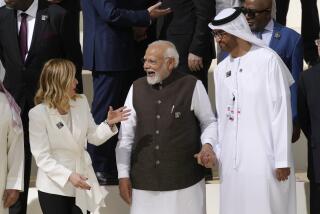GULF WATCH: Day 32 : A daily briefing paper on developments in the crisis. : Diplomatic Front:
- Share via
About 550 Western and Japanese citizens held since Aug. 2 in Iraq and Kuwait began arriving in their home countries Sunday. Iraq’s ambassador to the United States, Mohammed Mashat, was at the airport to greet the 47 Americans who landed at Washington’s Dulles airport, but he disappeared quickly after one man on the flight blasted the Iraqi policy under which thousands of Westerners are still held. Other passengers on that flight revealed details of the dire situation in the U.S. Embassy in Kuwait, where a swimming pool holds the only drinking water.
President Bush, from Kennebunkport, Me., referred to “challenging times” ahead as he prepared for a summit with Soviet President Mikhail S. Gorbachev. And U.N. Secretary General Javier Perez de Cuellar reiterated that he was “disappointed” that talks with Iraq’s foreign minister made no real progress. He said he was unable to persuade Iraq to comply with U.N. Security Council demands that it withdraw from Kuwait.
Military Front:
Four U.S. military vessels, including a crude-oil carrier, sailed through the Suez Canal on Sunday to join a growing international armada in the Persian Gulf assembled in the wake of Iraq’s invasion of Kuwait.
The freighter Denebola and vehicle cargo ship Cape Inscription, both under U.S. military sea-lift command, crossed the strategic waterway to the Red Sea. The other two vessels were the 38,717-ton crude carrier Cape Henry and the 20,731-ton ferry American Eagle.
Meanwhile, Moscow’s continued reluctance to take on a military role in the Persian Gulf was demonstrated as its foreign minister said the Soviet Union would leave it up to other countries to enforce the maritime blockade against Iraq.
Trade Front:
The Iraqi government acknowledged that it was rationing food but said Iraqis would rather eat mud than bow to a foreign power. Government spokesman Naji Hadithi denied reports that the U.N. embargo against Iraq caused shortages but said the government was instituting steps to reduce food consumption. “We have a war-tested society. We have a war-tested economy. So even if we eat mud, we will resist pressure and not kneel down to any foreign power,” he said.
At the same time, Libya told the United Nations that it would send food to Iraq as a humanitarian gesture.
Crisis Indicators:
* U.S. troops on the ground: 50,000-plus
* U.S. sailors aboard ships in region: 35,000
* U.S. reservists to be mobilized: up to 49,703
* Iraqi troops in/near Kuwait: 265,000
* U.S. diplomats remaining in Kuwait: 10
* Total Americans in Iraq and Kuwait: 2,718
* Total Westerners in Iraq and Kuwait: 11,385
* High temperature in Riyadh, Saudi Arabia: 106
More to Read
Sign up for Essential California
The most important California stories and recommendations in your inbox every morning.
You may occasionally receive promotional content from the Los Angeles Times.












